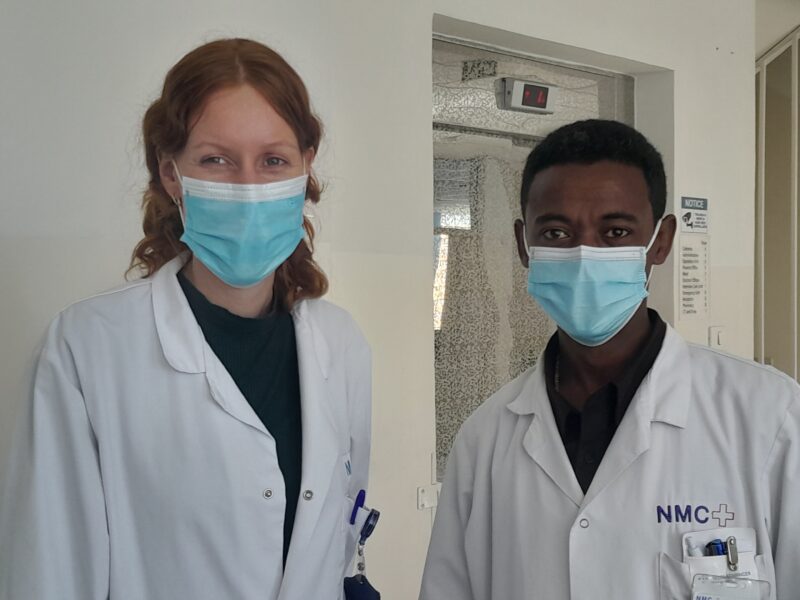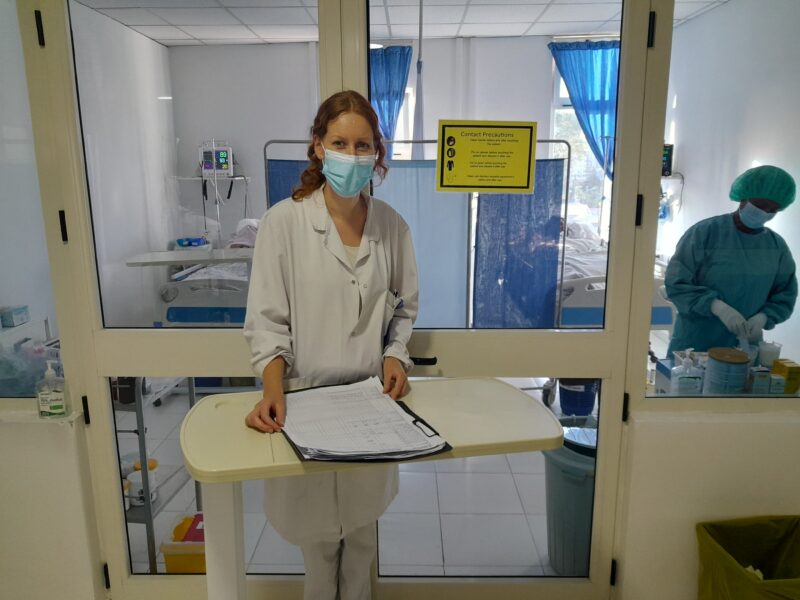Blog by Ambassador Mariska Kreuger
AMR patients in urban African hospitals
This blog by Dr Mariska Kreuger working in Ethiopia and is the third blog in a new series by AMR Insights Ambassadors.
Almost half the African population lives in urban areas. Here I share some of my observations about AMR in urban African hospitals!
Working as a medical doctor in Ethiopia
My name is Mariska Kreuger. I am from the Netherlands, where I got my Medical Degree and training in Tropical Medicine and Global Health followed by a Masters in Medical Microbiology. I have been working as a medical doctor in a small private hospital in Addis Ababa (Ethiopia) since 2017. The hospital aims to provide high-quality healthcare under very challenging circumstances. While antibiotic use is very restricted in The Netherlands, antibiotics are used indiscriminately in Addis. Last-resort antibiotics are administered even often at home, without any clue about antimicrobial sensitivity and resistance. How is it possible to provide high-quality care for infections in the context of antimicrobial resistance, in these kind of urban African settings? Is this still possible or are we already too late? And what do we do when patients with drug-resistant infections arrive at our hospital?
A normal day in the ICU
A normal day in the Intensive Care unit. We have a new admission referred from another hospital. The patient’s diagnosis is pneumonia, possibly bacterial and he is deteriorating and in critical condition. He was transferred to our hospital because he needed a mechanical ventilator. His antibiotic therapy was started 5 days ago with vancomycin and cefepime. No cultures were taken or no result is available. What to do next? Often we have to start these patients on the last-resort antibiotics, while waiting for our culture results. If they improve, we might have been targeting the right pathogens. If they deteriorate, we might have been dealing with multidrug resistance, or an infection with a different aetiology, we will never know.
The good news..
The good news is that there is change and growing awareness regarding antimicrobial resistance in urban African settings in East- and West-Africa. More and more diagnostics and treatment options are available resulting in the availability of timely bacterial culture results. Diagnosis is further assisted by imaging and laboratory tests which help us exclude alternative diagnoses. There are trainings on antimicrobial stewardship and infection prevention and control on the African continent and daily discussions at the bedside, by nurses and doctors who are informed and interested, really creates the big change. This is how we were able to implement contact-based precautions for all multidrug-resistant (MDR) patients in our hospital. This is how nurses and doctors became interested to send microbiology samples and started to take the results seriously. This is why, with help of a committed pharmacist, we started to use first-line cephalosporins as surgical prophylaxis, instead of third-line cephalosporins.
The bad news..
The bad news is that we are absolutely late. There are numerous challenges and frustrations. Awareness grows, but multidrug-resistance spreads faster. We see patients with multidrug-resistant infections such as carbapenem-resistant Gram-negative bacteria, including carbapenem-resistant Acinetobacter baumanni (CRAB) daily. Our observations are comparable with other studies in urban Africa, although there is very little data. Even in urban African hospitals, we see only the tip of the iceberg regarding drug-resistant bacterial pathogens most commonly because of unpredictable supply chains for laboratory reagents, delays in the transport of specimens, lack of knowledge or awareness among healthcare professionals, and the fact that diagnostic tests are more expensive than antibiotic treatment. There are also communication challenges between laboratories and clinicians. I have described the case for the bacteria. We know even less about viruses and fungi in our patients and we treat empirically. The increasing availability of antibiotics is a blessing, but also a curse. We face so much more carbapenem-resistance in the city since carbapenems have become widely available. And although people talk about infection prevention and control measures, the implementation is poor and isolation rooms, for example, are not available!
There is a lot to do, but we have to act fast!
Mariska Kreuger is an MD, trained in Tropical Medicine & Global Health and with a MSc in Medical Microbiology. She is working as a clinician in Nordic Medical Centre (Addis Ababa, Ethiopia), involved in Infection Prevention & Control. She performed research on leptospirosis in peri-urban Addis Ababa. In 2022 she attended a short course on containment of antibiotic resistance in hospitals in low-resource settings at ITM Antwerp and did a bacteriology internship in northern Benin.


